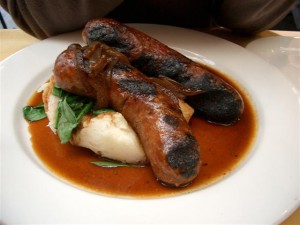
Lincolnshire -needing a shot of something else
- Guest Post
- 1
- Posted on
The Lincolnshire is lesser known than the Cumberland, its spicing of a milder bent. No robust pepperiness, but flecks of sage and parsley.
Almost unnoticeable, this month’s examples may work best in a casserole or with an onion gravy. Mr Frankland was unable to assist this time, they were picked up from a Tesco’s and hence may not be the best county ambassadors.
Lincolnshire sits up on the east coast. Mostly farmland, it is also one of the least ethnically diverse counties in Britain and is a popular retirement destination. The apparent blandness of our examples of the Lincolnshire sausage may then be appropriate. It is a sausage for a small town, to be eaten on a weekend morning with tea in a mug, near a stone church if possible.
With no recognition from the European Union, though they’ve tried, our examples are called simply ‘Lincolnshire sausages’ and could have been made anywhere. The ingredient list in its bluntness (Sodium Metabisulphite?) plants a metallic taste in the mind even before consumption. ‘Rusk’ turns out to be a type of bread filler, and not a cousin of the stoat and rat.
The uniformity of the sausages is unsettling. They are vacuum-packed and all of equal size and length, with that hexagonal look of sausages packed in a bundle too tightly. The instructions also, ‘Eat immediately’ are unnerving. Imperatives were not part of Mr Frankland’s vocabulary. The talk around the matter, suggestions, recommendations, small talk, are not present. The cashier has no apparent idea or interest in sausage choices.
With the abruptness of the instructions and eight sausages to work through, the cooking is split between the trusted cast iron pan, and a paper lined baking tray in the oven.
It is a paler sausage than the Cumberland, a visually unappealing sausage. The casing seems to burn faster, the temperature is dropped on the element for a slower cook. The sizzle sound from the pan may be recreated by listening to rain on the corrugated iron roof of a summer camp hut. A Saturday morning drizzle, around 7am, where there is nothing to do that day but card games and carry over of last night’s Monopoly.
Sadly one ruptures in the pan. The sausage splitting in two, held together by a piece of casing, like a worker’s finger in an industrial accident. A forestry worker, or fisherman. A second develops a fissure that cuts along its length. The sizzle sound rapidly rises like the heavier drops of water that have pooled on leaves and fall flat and fat upon the roof.
The second group are placed in the oven at 200 degrees and fair a lot better. There is an overall browning and no splitting. It affects the flavour, there is more caramelization, lending a sweetness to the pork. These would need no gravy.
Both groups retain their coarseness and a soft chewiness. The fat is lesser than the Cumberland, the sage either too mild or subtle for my palate. The non-meat filler, though part of a traditional Lincolnshire, gives it that Saturday morning sausage-sizzle feel. Onions in a plastic tub and tomato sauce from a caterer-sized bottle.
Mixed feelings. They were filling, but needed to be a part of something else, or at least accompanied. Garlic fried mushrooms or a spiced tomato chutney perhaps. Invite some colour and spice in there and these sausages would provide a stable base.



Replace ‘fair’ with ‘fare’ in your third to last paragraph and this would be an impeccable piece of writing.